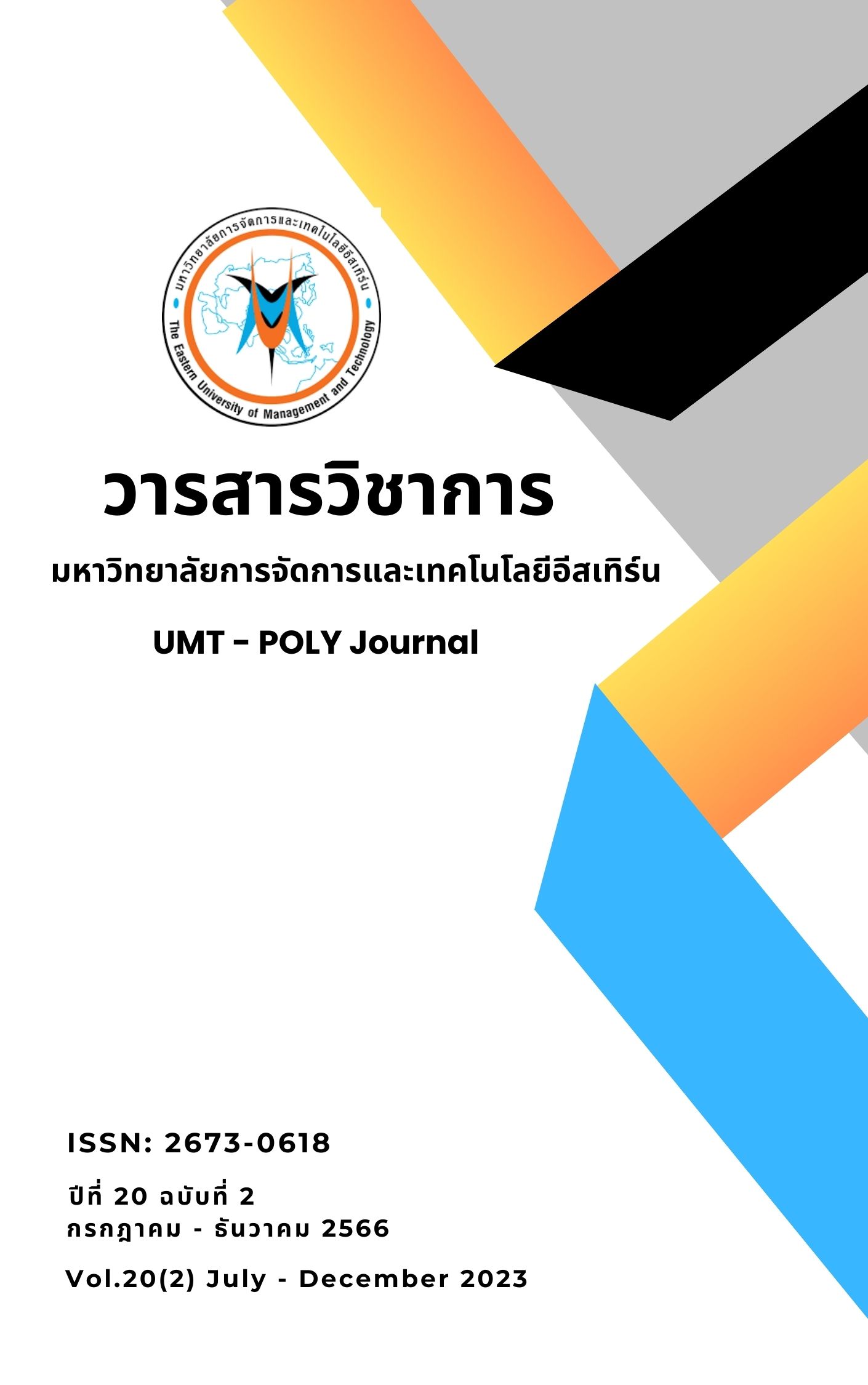ผลกระทบของการกำกับดูแลกิจการ ความสามารถในการทำกำไรกับ ผลตอบแทนกรรมการบริหาร: หลักฐานเชิงประจักษ์ กลุ่มบริษัทดัชนี SET 50
คำสำคัญ:
ความสามารถในการทำกำไร, การกำกับดูแลกิจการ, ผลตอบแทนกรรมการบริหารบทคัดย่อ
งานวิจัยนี้มีวัตถุประสงค์เพื่อศึกษา 1) ผลกระทบของการกำกับดูแลกิจการกับผลตอบแทนกรรมการบริหาร และ 2) ผลกระทบของความสามารถในการทำกำไรกับผลตอบแทนกรรมการบริหาร: หลักฐานเชิงประจักษ์ กลุ่มบริษัทดัชนี SET 50 การศึกษาครั้งนี้เก็บรวบข้อมูลทุติยภูมิ ระหว่างปี พ.ศ. 2560 - 2565 จำนวน 247 ตัวอย่าง และใช้เทคนิคการวิเคราะห์ความถดถอยพหุคูณ (Multiple Regression Analysis) )
ผลการวิจัยพบว่า การกำกับดูแลกิจการ ที่วัดจากการควบรวมอำนาจของกรรมการบริหาร และขนาดของคณะกรรมการบริษัท ส่งผลกระทบเชิงบวกอย่างมีนัยสำคัญต่อผลตอบแทนกรรมการบริหาร แสดงว่าการที่บริษัทมีการควบรวมอำนาจของกรรมการบริหารและขนาดของคณะกรรมการบริษัทที่มากขึ้นจะส่งผลให้ค่าตอบแทนของคณะกรรมการบริหารสูงขึ้น อย่างไรก็ตาม ความสามารถในการทำกำไรที่วัดจากอัตราผลตอบแทนจากสินทรัพย์ส่งผลกระทบเชิงลบอย่างมีนัยสำคัญต่อผลตอบแทนกรรมการบริหาร แสดงว่า การที่บริษัทมีอัตราผลตอบแทนจากสินทรัพย์สูงขึ้นส่งผลให้ค่าตอบแทนของคณะกรรมการบริหารลดลง ในทางกลับกัน อัตราผลตอบแทนจากส่วนของ ผู้ถือหุ้นไม่ส่งผลกระทบต่อผลตอบแทนกรรมการบริหาร งานวิจัยนี้มีประโยชน์ต่อผู้มีส่วนได้เสียและหน่วยงานกำกับดูแลสามารถนำผลการศึกษาไปใช้ประกอบการกำหนดนโยบายที่เหมาะสมเพื่อลดปัญหาตัวแทนได้
Downloads
เอกสารอ้างอิง
Ayadi, N., & Boujèlbène, Y. (2013). The influence of the board of directors on the executive
compensation in the banking industry. Global Business & Management Research, 5.
Adthajak, P. & Poonpool, N. (2023). The Trends in Compensation Measure of Board of Directors from Past to Present. The 9th Business, Economics and Communications International Conference (The 9th BECIC2023) & The 10th National Conference, 2023 . 257- 268. https://bec.nu.ac.th/becic/files/NPSC2023.pdf
Bersa, A. (2021). The Relationship between Firm Performance, Earnings Management, and Executive Compensation of Thailand Listed Company. (Master’s Thesis). Prince of Songkla University. Thailand.
Chinchotangkul, R. (2007). The relationship between corporate governance and audit fees of listed
companies in the stock exchange of Thailand. (Master’s Thesis). Chulalongkorn
University. Thailand.
Hair, J. F., Black, W. C., Babin, B. J., & Anderson, R. E. (2010). Multivariate Data Analysis. New Jersey : Saddle River.
Husnin, A.I., Nawawi, A., & Salin, A.S. (2013). Corporate governance structure and its relationship with audit fee-evidence from Malaysian public listed companies. Asian Social Science, 9, 305-317.
Janjarasjit, S., Uthayapong, T. & Adthajak, P. (2023). Corporate Governance and Audit Quality in Thailand. Proceedings of the International Conference on Sustainable Innovation Universitas Muhammadiyah Yogyakarta, Indonesia, 9-10 August 2023. (page 54-60). Universitas Muhammadiyah Yogyakarta, Indonesia. Retrieved from https://prosiding.umy.ac.id/icosi/index.php/picosi/issue/view/12
Jensen, M.C. (1993). The modern industrial revolution, exit, the failure of internal control Systems’,
Journal of Finance, 48(3), 831-880.
Jensen, M. C. & Meckling, W. H. (1976). Theory of the firm: Managerial behavior, agency costs and ownership structure. Journal of Financial Economics, 3(4), 305-360.
Jinarat, V. (2022). Modern Research Methodology. Ubon Ratchathani : Yong Sawat Inter Group Company Limited.
Meijerink, J., & Bondarouk, T. (2023). The duality of algorithmic management: Toward a research agenda on HRM algorithms, autonomy and value creation. Human Resource Management Review, 33(1), 100876.
Narayam, S. & Suwanna, T. (2018). The Relationship between Profitability and Executive Compensation of Companies Listed on The Stock Exchange. Rajabhat Rambhai Barni Research Journal, 13(3), 26-33.
Namkhan, J., Songjarean, P. & Sahunalu, S. (2022). The Relationship Between Profitability and Executive Compensation of Listed Companies in the Stock Exchange of Thailand. Rajapark Journal, 16(46), 342-355.
Sabsombat, P. (2014). Characteristics and Remuneration of Executives Who Influence the Performanceof Listed Companies in The Stock Exchange of Thailand. Journal of Humanities and Social Sciences, Rajapruk University, 15, 385-397.
Saechua, P., & Boonmunewai, S. (2019). The relationship between family-firms, executive
compensation, and firm performance of listed in the Stock Exchange of Thailand. Journal of
Business Administrator and Accountancy, 2, 75–95.
Saengwanitwattana (2020). Effect Of Top Management And Board Compensation On Firm
Performance Through Risk Management. (Master’s Independent Study).
Thammasat University, Thailand.
Srisukha, P., Sutthachai, S. & Uthayapong, T. (2022). The Relationship Between Chief Executive Office
(CEO) Characteristics and Audit Fee of Companies listed in the Stock Exchange of Thailand.
Journal of Federation of Accounting Professions, 4(10), 20 – 42.
Sukitpraneenit, S., Nititeerat, S., Noibuddee, N., & Vishuphong. P. (2022). Comparison of Investment
Performance in SET50 Stocks and SET50 Index Funds with Dollar - Cost Averaging (DCA)
Strategy. Journal of Innovation in Business, Management, and Social Sciences, 3(1), 20-41.
The Stock Exchange of Thailand (2012). Executive Compensation for listed companies 2012. Retrieved from https://setsustainability.com/download/c94vox6q7uzpgyk
The Stock Exchange of Thailand. (2023). SET50 & SET100 INDEX CONSTITUENTS. Retrieved from
https://www.sec.or.th/cgthailand/TH/ Documents/Regulation/CGCode.pdf.
Wonglacron, S. & Sanpakdee, P. (2023). The Impact of the Board Structure on the Performance of
Companies Listed on the MAI Stock Exchange. Journal of Legal Entity Management and
Local Innovation, 9(4), 1-13.
ดาวน์โหลด
เผยแพร่แล้ว
ฉบับ
ประเภทบทความ
สัญญาอนุญาต
ประกาศลิขสิทธิ์
เนื้อหาและข้อมูลในบทความที่ลงตีพิมพ์ในวารสารวิชาการมหาวิทยาลัยการจัดการและเทคโนโลยีอีสเทิร์น ถือเป็นข้อคิดเห็นและความรับผิดชอบของผู้เขียนบทความโดยตรง ซึ่งกองบรรณาธิการวารสารไม่จำเป็นต้องเห็นด้วยหรือร่วมรับผิดชอบใด ๆ
บทความ ข้อมูล เนื้อหาหรือรูปภาพ ฯลฯ ที่ได้รับการตีพิมพ์ในวารสารวิชาการมหาวิทยาลัยการจัดการและเทคโนโลยีอีสเทิร์น ถือเป็นลิขสิทธิ์ของวารสารวิชาการมหาวิทยาลัยการจัดการและเทคโนโลยีอีสเทิร์น หากบุคคลหรือหน่วยงานใดต้องการนำข้อมูลทั้งหมดหรือบางส่วนไปเผยแพร่ต่อหรือเพื่อกระทำการใด ๆ จะต้องได้รับอนุญาตเป็นลายลักษณ์อักษรจากวารสารวิชาการมหาวิทยาลัยการจัดการและเทคโนโลยีอีสเทิร์นก่อนเท่านั้น




